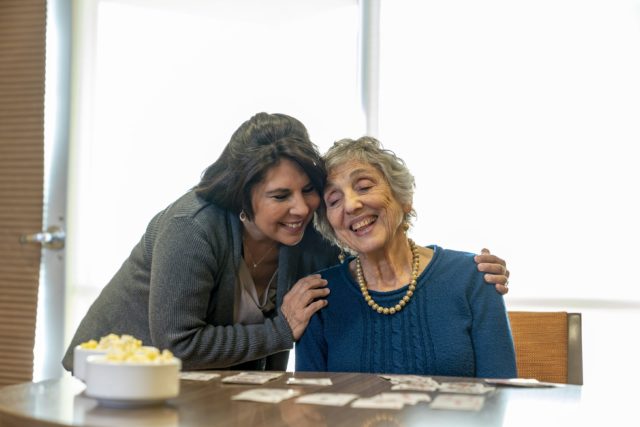Karl was approaching his mid 70’s when his family noticed he was having memory deficiencies. He was having trouble remembering simple things, like which month of the year it was, or which street he lived on. Karl’s family made sure he received extensive medical care and it was determined that Karl suffered from dementia. As the years progressed, Karl’s family began wondering what they could do to give him the best quality of life as he continued to age. And that’s when they discovered memory care at their local assisted living community. Karl’s family loved the idea of keeping him local. Close by, so he could continue watching his grandchildren grow up. And with all the support services he would need to continue to live as independently as possible. What is memory care? Can it help your loved one lead a happy and fulfilling life even if they have the diagnosis of dementia or Alzheimer’s Disease?
Memory Care offers seniors a unique environment in which they can thrive within an assisted living community. Let’s look at a few benefits that memory care offers for those who need some extra care.
Support. Memory can have an impact on daily basic self-care. An individual may find it increasingly difficult to bathe themselves, dress, brush their teeth or remember meal times. Memory Care can offer individuals extra support in these areas as needed. Staff can develop a relationship with a senior who is experiencing memory loss and assist them with basic everyday care.
Activities. As dementia or Alzheimer’s progresses, seniors may need tailored activities and care. Memory Care has the advantage of providing specially trained staff who can adjust daily interaction according to an individual’s needs. Activities may be provided which promote mental stimulation based on an individual’s current needs. Seniors who are in a secure environment can learn to thrive on these daily activities tailored to their specific needs.
Structure
In an assisted living environment, much of a senior’s daily life depends on their own motivation. Breakfast may be skipped, activities selected based on interests, and daily grooming routines can be left up to the individual. Memory Care provides seniors with structure when they no longer can build this structure themselves. People with memory deficits can thrive on consistent routines. In a family setting, daily life can be very different on a day to day basis. A senior with dementia or Alzheimer’s may find it comforting to have specially trained caregivers who guide them through set routines every day and encourage them to attend appropriate activities and outings. It’s important to ensure these seniors have consistent and healthy meals, daily appropriate physical activity, and mental stimulation adjusted to their needs. It’s just a little extra support to create a secure environment while keep individuals as independent as possible.
Specially trained staff. If you ever have spent time with someone who is experiencing memory deficits, you understand how time consuming and the energy it takes to learn what that person needs to feel safe and secure and happy. This can be an ongoing process and require much self-education as well as hit or miss guesswork. Caregivers taking care of your loved one in a Memory Care setting are experienced in caring for these seniors, and can give them the extra support they need to live a fulfilling and happy life in a secure setting. Think about it as one big specialized team along with your senior’s doctors who can support your loved one through these changing seasons of life.
Family is important and should continue to be as involved as possible, but it can be difficult for family members to provide a steady, regular routine for grandma or grandpa in a family environment in your own home. Memory Care can offer all the supportive benefits while keeping an individual as independent as possible. This specialized care allows them to feel the comfort of having their own home environment while continuing to feel the love and warmth family brings during frequent visits.
If you have a senior that may need Memory Care, you can tour some local assisted living communities offering this additional benefit and see which community could be the best fit for your loved one. You may consider a community that is close by to ensure that you can still be a big part of their life. In fact, you can connect with staff in your senior’s memory care and determine how you can best support your senior’s development and care in collaboration with their caregivers and medical providers. Perhaps you can be involved in daily activities or attend community events with your senior. Find out how what is right for your family in providing best care for your loved one. Give them the assistance they need in a nurturing environment and watch them live a meaningful life, all while living near family!



Loved this and the article about brain games. Keep them coming! We need more about how to stay mentally sharp.
Thank you for commenting Betty! Check out our latest article on Memory Care as well!